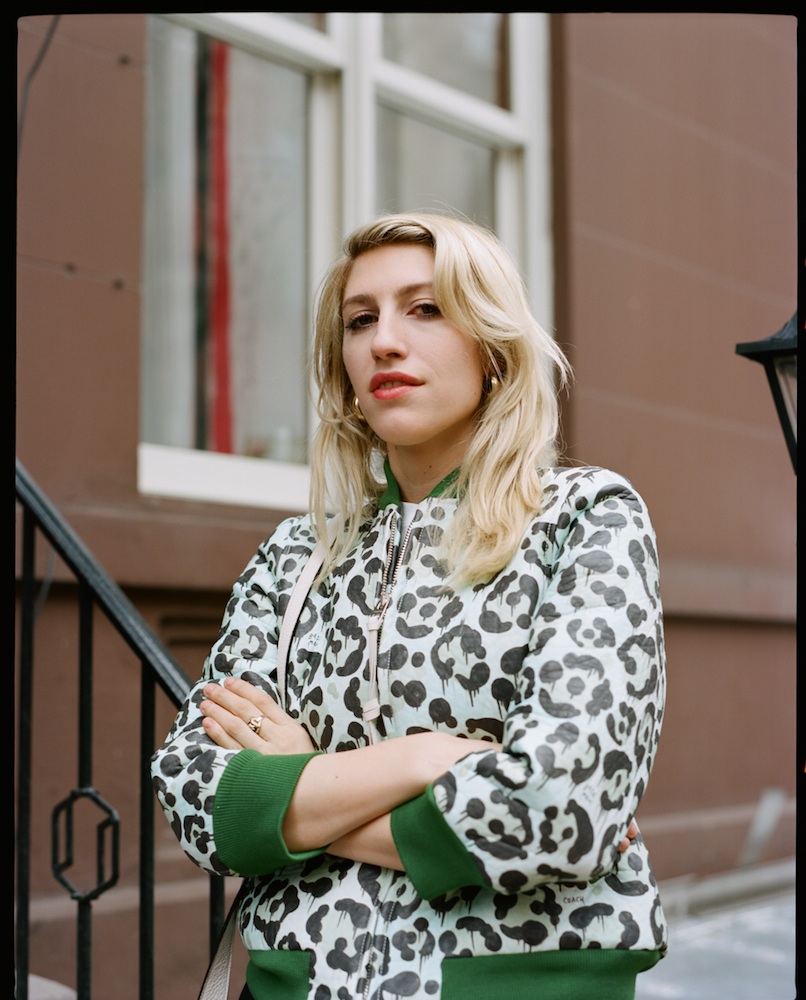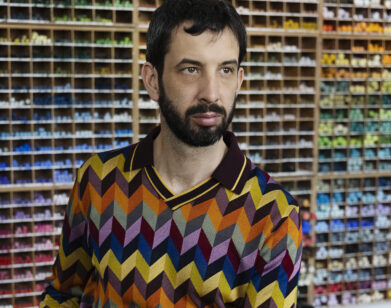Karley Sciortino

ABOVE: KARLEY SCIORTINO IN NEW YORK, MARCH 2015. PHOTO BY TEDDY FITZHUGH. WILD BEAST LEATHER BASEBALL JACKET: COACH. RIVETS DAKOTAH 14 CROSS BODY BAG: COACH
As a writer, it’s important to have a place that you call your own—a place to escape, to be alone, a place to think. For Karley Sciortino, the voice behind sex blog Slutever and a columnist for Vogue, it wasn’t until recently that she had this inner peace.
“I work from home and realized that my work was suffering because I was living in a loft with three other girls,” she says. “All I do is sit at home online. When people are screaming about how they’re hungover all day, you want to kill yourself.”
While Sciortino now considers herself a writer, and is regarded by others as such, she took the path of a true millennial to arrive where she is. Beginning in a squat in London with no money after dropping out of school, Sciortino started self-publishing explicit stories about her sexual endeavors, and soon began gaining a following online. Since then, her blog has grown exponentially and was re-launched a few weeks ago, inviting voices aside from her own to appear.
Going hand in hand with sex, is, of course, fashion. So it only makes sense that Sciortino fuses the two, occasionally in writing, but even more so in her daily appearance. Always showcasing her personality, Sciortino embraces color, unlike many New Yorkers, shying away from the typical all-black everything. Standing just outside of her Gramercy apartment in the above photo, she looks like her natural self—statement red lipstick, loosely styled blonde hair, and wearing the Wild Beast Leather Baseball Jacket from Coach’s Spring/Summer 2015 collection. In fact, Sciortino might even resemble a modern-day Patricia Arquette, the leading lady in Quentin Tarantino’s True Romance—a film that inspired Coach Creative Director Stuart Vevers’ collection.
We spoke with Sciortino about how she came to be the woman she now is, what her parents think, and what is left unsaid.
EMILY MCDERMOTT: I know you started your blog when you were living in London after you dropped out of school. What made you decide to drop out and start writing?
KARLEY SCIORTINO: It was sort of unplanned…I guess one doesn’t plan to drop out of school. [laughs] I moved to London because I was doing a theater program. I was really into theater and acting, but I quickly realized I didn’t like being around the theater kids. I went from being captain of the sports team to editor of my high school yearbook and I felt really burnt out. I think I was like, “I just want to do my thing for a while!”
I spent a couple years living in this squat and for the first time in my life I was emerged in the arts scene. I was hanging out with a lot of artists and musicians in London. It wasn’t even a squat; it was a commune with 14 other people. It was this breeding ground for creativity, but also insanity because it’s just a bunch of early 20 year olds with no jobs and not paying rent. Then, naturally, I was writing about it… Initially, this blog was just to document what was going on in my life, what was going on in that squat, and what was happening with my friends.
MCDERMOTT: What was the first story you wrote?
SCIORTINO: It’s something about growing up. I was 21, and at the time I felt that I was an adult, like, “I’m starting to cycle out of my complete 24/7 party mode and think about my future.” At the time it seemed kind of heavy, but that blog actually did become my future.
MCDERMOTT: What made you come back to the United States?
SCIORTINO: I ended up coming back because I was basically deported. I was doing that [thing] where you leave the country for a weekend and come back and get another tourist visa. I was doing that for a really long time. I was coming back from Paris, and they just said to me, “Hey, you’re only living here through a loophole. Here’s a stamp. You have to leave by next week.”
But, not to sound cheesy, I think it was good. I was 24, and I needed to focus a bit more. I think New York as a city—whether you like it or not—focuses and motivates you. Because your overhead is high, you have to work, also because it’s so competitive. In London, I probably would have just gotten drunk for the rest of my life and no one would have liked me anyhow.
MCDERMOTT: Had you ever lived in New York before?
SCIORTINO: I’d never lived in New York City, but I’m from an hour and a half north of here, so my parents live nearby and so many people I grew up with lived here. It felt like the obvious choice.
MCDERMOTT: What do your parents think about what you do?
SCIORTINO: I’ve never had a conversation with my dad about it. Ever. He’s never brought it up. He’ll say, “Do you have a lot of work to do?” vaguely. In the beginning, I thought they would really hate it because they were conservative and catholic. I was taught, “Don’t have sex before marriage!” Literally. My mom’s a religious educator, so it really destroyed our relationship for a few years. There was a real barrier between us, and then they slowly began to realize I’ve supported myself since I was 18, so they couldn’t really argue with it. They couldn’t say, “You couldn’t make it on your own, you have to get a real job!” They just kept saying, “Get a real job,” until, “I guess she’s supporting herself, she has a real job.” I think they had to agree to disagree and it’s still to this day like that. I think it’s sad because I feel like parents want to brag about kids to their friends. Those are the ones that you live for, right? And my parents have never been able to do that.
MCDERMOTT: How does that make you feel?
SCIORTINO: I think it’s okay. I [met someone who] makes gay zombie porn. I was like, “How did you start making porn, considering you have parents?” He was like, “Do you think Warhol or Fassbinder ever said ‘Oh, God I can’t do that because what would my parents think?'”
At a certain point, you are an adult and you can’t think of this anymore. Think about the travesties the world would have faced if every great artist was thinking about their parents all the time. It’s a barrier you have to get over. I have friends who stayed in jobs because their parents said they should, and it’s like, why would you let someone set your decisions for you? I always felt pretty strongly about my own decisions.
MCDERMOTT: What do you find is the biggest difference between self-publishing versus writing for a publication? Which do you prefer?
SCIORTINO: There’s benefit in both. I like self-publishing because it’s one of the greatest tools of modern life. I know there a lot of criticisms because people are writing for free and not getting paid, but it’s how I started my career. I don’t think in the past I could have had the career I have, having not gone to college. People work their way up a ladder when they write in conventional ways, but not anymore. I think it’s lot easier for people to think for themselves in a way that it’s never existed before.
You can create your own space. It sounds cheesy, but when I started I don’t think there were magazines or platforms that had a lot to say about sex relationships written from a young girl’s perspective, or a young feminist perspective. You could say it was Playboy, but it was completely different. I also think that sometimes there’s always the benefit of having someone else’s opinion. Even writing for Vogue now, I can respect my editor’s situation. Self-editing is hard, because on your blog, you can be like, “I’ll just talk until I’m done,” and I never have to think about length and getting my point across in a direct way. Writing for publication, the bar is higher in terms of quality. People who self-publish, people who review their own work, can get lost in the idea of a limitless world, and sometimes limits are really helpful.
MCDERMOTT: Do you ever think that the editing process changes what your original intent was, or the amount that you can write in your own voice?
SCIORTINO: I haven’t really experienced that yet, thankfully. I think a lot of publications understand. In a world where there is so much content, and magazines are publishing a lot of the same content, or work that talks about the same things, the only thing that’s left to distinguish you is voice. I think that magazines are realizing now, and I think blogs and personal essays have taught us, that people like to follow a singular voice, and that’s something new. People care what Vogue has to say, but they need to be so much more careful now, in a world where there’s thousands of fashion magazines. They have to have individual voices, and I think they know that.
MCDERMOTT: You really started devoting time to your blog and writing in 2009, how do you think you’ve changed since then?
SCIORTINO: I think a bit more professionally. I’ve streamlined it a bit more, and actually, I just re-launched my blog today. I was always going to be the sole owner of my blog, but then I was like, “Wait, that’s pretty narcissistic because then I would be the only person that has a say.” [laughs] So today, I posted something to my blog an hour ago, and I’m going to start having other people contribute to it. That’s the first time that’s ever happened for me.
I definitely think 2009 was a changing point for me, where I thought I was going to start thinking of this as a job, but now, I’m playing with the idea of actually doing the opposite, and opening it up a bit more. What I want, and what I feel like it’s lacking in terms of content, is a bunch of people being open, honest, and [having] witty dialogue about sex and sexuality that doesn’t beat around the bush. I’m going to start incorporating voices from other people and internalize them—personal essays and also sex researchers, psychologists, people in sexual help, and also sex workers, like people in porn or people who work as escorts. I want it to be more of a community.
MCDERMOTT: You’ve written very explicitly about your own sexual endeavors. Is there anything you would not write about?
SCIORTINO: I realized pretty early on that just because you have no shame and will spill your guts on the Internet about everything, doesn’t mean everyone else in your life does. In the beginning, [I assumed] I could just tell a story about what happened and include the names of my friends, and more specifically, write about my sex life and the people I was dating without asking them if that was okay. I’m now realizing that some people are private, so I’m more careful about how I incorporate other people in my stories. I don’t think I’ve ever censored myself too much, but honesty is the ultimate tool for connecting. I like to think that’s what success is based on. It’s just about being explicit.
MCDERMOTT: What are you working on now? I know you have talked about writing a book.
SCIORTINO: I actually finally started doing that. It’s exciting but books are super long and I kind of want to kill myself. [laughs] I just finished a proposal. It’s essentially a book about the increasing flexibility of modern sexuality, specifically in terms of sexual orientation and gender. Then I wrote a movie a year and a half ago, which is now in development. I’m casting and stuff. It’s essentially a dark comedy about a slutty girl. It’s exciting, but I’m also trying not to get too excited because I’m learning the process of making movies, and sometimes it takes years and years. That terrifies me, because when you’re a blogger, you have no patience.
MCDERMOTT: Everything is immediate, so that’s a lot of learning how to be patient.
SCIORTINO: Yeah, but I think that’s really valuable. As you get older, instant gratification is great and gives you confidence, but you want to allow yourself to work on larger projects—you’ve accomplished something larger and more important than all the little things.
For more from this series, click here.






